#eu membership for moldova
Text
Roberta Metsola is president of the European Parliament. She has gone on record as favoring observer status for Ukraine and Moldova in the EU Parliament.
The EU last year designated Ukraine and Moldova as official candidate countries, shortly after Russia invaded Ukraine. Since then, Metsola has been clamoring for official accession negotiations to begin this year.
EU leaders are due to decide whether to formally open Ukraine and Moldova’s accession talks at a summit in December, once they’ve parsed a heavily anticipated report from the European Commission providing a status update on all countries still waiting in the EU’s wings.
“Make no mistake: Politically if a country looks to Europe, then Europe should fling its doors wide open,” Metsola told POLITICO in an interview in her ninth-floor office at the Parliament in Brussels.
President Metsola has been a high profile supporter Ukraine for a while.
Metsola, who at 44 is the Parliament’s youngest president ever, was the first EU leader to visit Kyiv, meeting Ukrainian President Volodymyr Zelenskyy on April 1 last year; a giant photo of the pair shaking hands now hangs on the esplanade in front of the Parliament in Brussels, a visual symbol of her championing the country in its war against Russia.
“Enlargement has always been the European Union’s strongest geopolitical tool,” Metsola said.
The EU needs to play a greater role regarding Ukraine, it would be advantageous for both the EU and Ukraine. A belligerent and imperialistic Russia which is headed by an unhinged dictator requires a strong counterbalance in Europe.
#invasion of ukraine#stand with ukraine#european union#eu#roberta metsola#european parliament#eu membership for ukraine#eu membership for moldova#russia#russian imperialism#russia's war of aggression#vladimir putin#агрессивная война россии#русский империализм#военные преступления#владимир путин#путин хуйло#евросоюз#руки прочь от украины!#геть з україни#євросоюз#європейський парламент#роберта мецола#деокупація#україна переможе#слава україні!#героям слава!
5 notes
·
View notes
Text
studying at uni has genuinely made me insufferable. every time theres eu news i physically have to discuss it w everyone
#not necessarily in a good way#anyway if u havent heard. moldova ukraine eu candidate membership status day today#rens originals
2 notes
·
View notes
Text
European Parliament insists on starting accession talks with Moldova
MEPs are voting to reiterate their commitment to Moldova’s future EU membership and want accession talks with Chişinău to start before the end of the year.
According to the European Parliament members, the Moldovan government has demonstrated its determination and ability to fulfil the European Commission’s demands to begin membership talks. They also stressed that Moldova’s EU membership would represent a geostrategic investment in a united and strong Europe.
The MEPs stressed the importance of carrying out reforms in the country, not only for the EU accession, but, above all, for a tangible improvement in the living standards of Moldovans.
EU member states plan to increase their financial and technical aid to Moldova in order to facilitate the country’s fast and effective integration into the EU, according to the resolution adopted by MEPs.
Read more HERE

#world news#world politics#news#europe#european news#european union#eu politics#eu news#europa#membership#moldova
0 notes
Text
Thousands rally in Georgia to push government on EU membership
New Post has been published on https://www.timesofocean.com/rally-in-georgia-to-push-government-on-eu-membership/
Thousands rally in Georgia to push government on EU membership
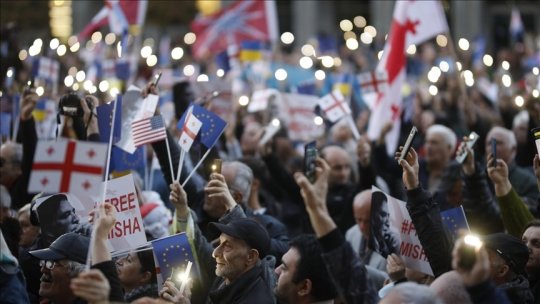
Belgrade, Serbia (The Times Groupe) – The Georgian capital Tbilisi was filled with thousands of protesters calling on the government to maintain the country’s EU membership course. GEORGIA
On Sunday, demonstrators gathered outside the parliament and urged the government to implement the necessary reforms to integrate Georgia into the European Union.
A rally was organized by the United National Movement (UNM), the main opposition party founded by jailed ex-president Mikheil Saakashvili.
They chanted slogans for closer ties with the EU as they waved Georgian and EU flags.
As well as banners supporting Saakashvili, who is serving a six-year prison sentence for abuse of power, protesters also condemned Russia.
UNM opposition leaders accused the government of backsliding on democracy and acting under Russian influence.
As a result of not meeting the EU’s 12-point criteria, the government of Prime Minister Irakli Garibashvili failed to secure Georgia’s EU candidate status last year.
After Ukraine applied for EU membership on Feb. 28, just four days after Russia launched its first attack, Georgia and Moldova applied on March 3 last year.
The EU Commission granted candidate status to Ukraine and Moldova on June 17, but said Georgia’s bid would be reassessed once it met the bloc’s criteria. Times of ocean TIBLISN
#belgrade#EU flag#eu membership#European Union#Georgia#Georgian capital Tbilisi#Mikheil Saakashvili#Moldova#Prime Minister Irakli Garibashvili#Russia#Russian influence#Serbia#The Times Groupe#United National Movement (UNM)#Politics
0 notes
Text
“I sometimes hear people say that Russia was forced to attack Ukraine because Ukrainians wanted to join NATO. Those people also often say that NATO promised it would not expand to the East, but later broke this promise. And this, allegedly, is the reason why Russia keeps attacking its neighbors.
If you have ever heard people say something like that, please know that this is not true. And it will take me less than five minutes to prove with facts that both statements are false.
First, let's have a look at the timeline of events.
Russia first invaded Ukraine in February 2014 by occupying the Crimea peninsula. At that moment, Ukraine was a neutral country by law and expressed no intention of joining NATO whatsoever. For instance, during the Revolution of Dignity, the protesters insisted on Ukraine joining the EU, not NATO. It was only in autumn 2014, after many months of war, that Ukraine abandoned neutrality.
So what came first? Russia attacking Ukraine, or Ukraine wanting to join NATO?
The answer is clear.
Had Russia not threatened Ukraine's existence, there would be no reason for our country to seek collective security. So please do not repeat the lie that, I quote, “Russia attacked because Ukraine wanted to join NATO,” end of quote. This does not correspond with the facts.
Now let's have a look at the story of NATO allegedly promising not to expand to the East.
If you ask people who say this, when exactly, such a promise was made and who made it, most of them will not be able to provide a clear answer. Spoiler, because no such promise has ever been made and the whole story is a Russian fairy tale.
Those more sophisticated will tell you that the promise was made to the President of the USSR, Mikhail Gorbachev. They may even refer to the 1990 U.S.-Soviet negotiations on the reunification of Germany. Again, let’s consider the timeline.
In summer 1990, when these talks were held, the Soviet analog of NATO, the Warsaw Pact, still existed. Its dissolution, let alone the Soviet Union's dissolution, was not on the cart. No one even talked about it or imagined it. It was only next year, in 1991 that the Warsaw Pact, and later the USSR, quite unexpectedly ceased to exist.
Now explain to me just how the very issue could be even discussed in the summer of 1990. It is not surprising that Mikhail Gorbachev later himself refuted this falsehood. When asked by a journalist whether any such promise had been made, he said this was a myth.
Now let's look at it from another perspective. How could NATO even promise anything like that?
Initially, it is not NATO that decides which country joins it. Countries themselves need to want it. And actually, the membership criteria are very difficult. It requires a lot of political will and reform. All the NATO members that joined it after 1991, really wanted to be part of it.
Their people wanted this.
And here comes the most uncomfortable question for Russia: Why were all of the nations that had been part of the Soviet Union or the Socialist bloc so eager and desperate to join NATO?
Well, maybe because in three decades, Russia has invaded or incited war in at least three of its neighbors, Moldova, Georgia and Ukraine. At the same time, Russia has not dared to invade any of its NATO neighbors.
Do you see the pattern?
The only reason for countries in the vicinity of Russia to seek NATO membership has always been and remains the need to protect their people from Russia.
Therefore, Moscow has only itself to blame for the fact that all of the central European and Baltic nations ran away from it and hid under the NATO umbrella as quickly as they could.
Do not let Russian officials or their supporters in the West fool you. Russia attacked Ukraine not because NATO expanded to the East, or because Ukraine wanted to join NATO. Russia attacked because it denies Ukraine's right to exist and wants to conquer our land and kill our people. It is through our shared strength that we can and must stop Russia and put an end to its aggressive plans for the rest of Europe.
For this to happen, keep supporting Ukraine and don't buy Russian lies.”
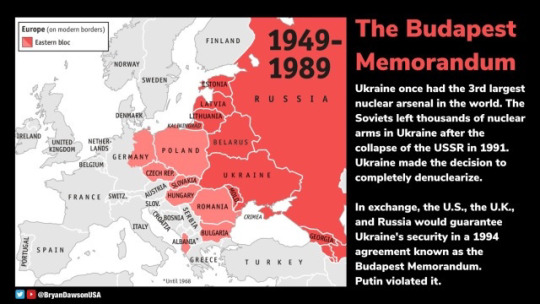
👉🏿 https://www.brookings.edu/blog/up-front/2014/11/06/did-nato-promise-not-to-enlarge-gorbachev-says-no/
👉🏿 https://www.tumblr.com/odinsblog/686191406300184576/appeasement-does-not-work-appeasement-didnt
👉🏿 https://www.tumblr.com/odinsblog/684530801484922880/believing-putins-reasons-for-invading-ukraine
👉🏿 https://www.tumblr.com/odinsblog/742088177664344064/violated-agreements-1991-russia-cosigns
#politics#ukraine#russia#dmytro kuleba#russian propaganda#nato#russian colonialism#nato expansion#russian imperialism#mikhail gorbachev#russia is a terrorist state#warsaw pact#russian expansion#russian fascism ☭#soviet union#tankies#vladimir putin is a war criminal#baltic states#🇺🇦
82 notes
·
View notes
Text

European Union seeks to strengthen their allyship with additions of Ukraine and Moldova.
🇺🇦! 🇲🇩!
This is a blow to Russia and other authoritarians in the region.
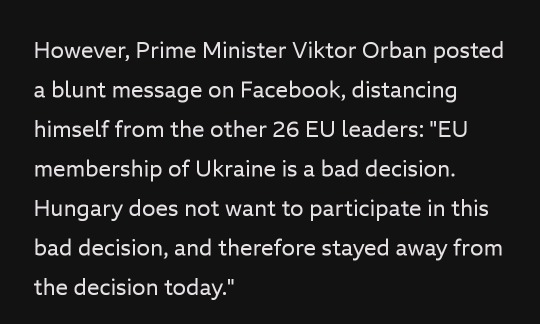
Who else is against the Ukraine membership to the EU? None other than CPAC/MAGA idol Viktor Orban of Hungary. The same Orban who gets star treatment from knobs like Tucker Carlson.
So for clarification: Democratic European allies and Ukraine would be good for America.
Those against a strong EU would be Russia, Hungary, and MAGA traitors.
143 notes
·
View notes
Text
Russia-Ukraine Daily Briefing
🇷🇺 🇺🇦 Monday Briefing:
- Russians are more actively using ammo with poisonous substance
- Pope provokes outrage by saying Ukraine should ‘raise white flag’
- Moldova faces threats from Russia as it turns toward EU membership
- Bond investors are lining up to fund the war against Putin
- Russian mil. cemeteries laying bare the huge cost of the Ukraine war
- Armenia is considering seeking EU membership
- US prepared for potential Russian nuclear strike in Ukraine in late 2022
- Macron's camp launches EU election campaign with eye on Ukraine
- Torture part of Russia's war policy in Ukraine: UN
📨 Daily newsletter: https://russia-ukraine-newsletter.beehiiv.com/
💬 Telegram: https://t.me/russiaukrainedaily
Socials: https://linktr.ee/rvps2001
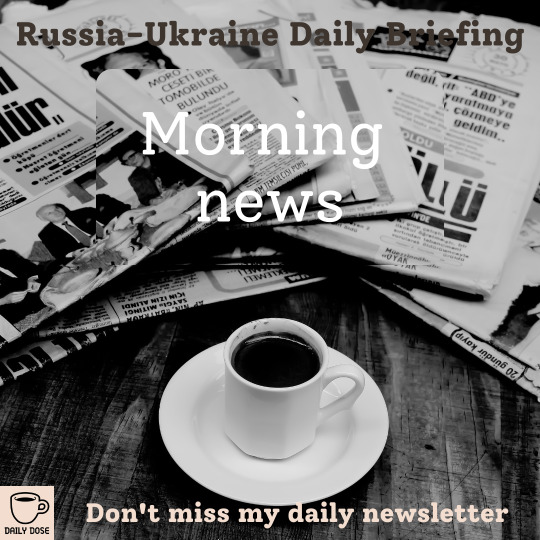
#russia ukraine war#ukraine russia war#ukraine war#russian army#russian war crimes#news#newsletter#russia#ukraine
9 notes
·
View notes
Text
Alexandru Musteata, director of the Moldovan Intelligence and Security Service, SIS, said on Tuesday that Russia is involved in a malign operation to compromise Moldova’s EU accession hopes by interfering in its electoral processes.
Musteata said that Moscow first targeted Moldova’s local elections in November 2023 and will now seek to meddle in presidential elections and the country’s EU integration referendum this autumn and parliamentary elections in July 2025.
“Now they are trying to complete the next two stages, to interfere in this year’s electoral processes. We have information that attempts are being implemented to compromise the referendum for European integration, to interfere in the presidential elections, and to denigrate political institutions and candidates that will promote EU accession,” said Musteata.
The head of the SIS explained that Moscow will support various different kinds of political actors under the direct or indirect control of the Russian Federation, who, once elected, will serve the hostile interests of the Kremlin.
“Openly declared pro-Russian political actors, they have direct and confirmed links to Russian special services, political consultants, organised crime groups under Kremlin leadership, oligarchic groups and political actors who declare that they support the state, hiding behind neutral foreign policies, declaring that they defend the national interest, neutrality and statehood, but in fact, their purpose is to serve Moscow in a camouflaged form,” he said.
Musteata named politicians connected to organised crime groups led by fugitive Moldovan oligarchs who are wanted for arrest.
“All of them are planning economic and social crises, social clashes to incite inter-ethnic hatred, security or public order crises, including in the region of UTAG [the pro-Russian region of Gagauzia] or on the left of the Dniester River [the separatist region of Transnistria],” he added.
The SIS chief predicted that the destabilisation attempts will be controlled by the fugitive oligarch Ilan Shor and will be initiated from Gagauzia in the south of Moldova, where Shor is highly influential and spends considerable sums of money on organising protests and violent actions.
“This strategy can already be seen publicly. These forces will promote the false message that the Republic of Moldova’s accession to the EU would affect the country’s sovereignty,” said Musteata.
Musteata also drew attention to the use of the Telegram and TikTok apps to spread disinformation, but also attempts to use TV channels for propaganda.
Moldova has banned the main Russian TV channel alongside domestic TV channels owned by the fugitive oligarchs Shor and Vlad Plahotniuc. But a channel owned by Shor, TV6, which was banned at the national level, has started to broadcast its programmes again via Gagauzian local TV station Gagauz Radio Television, GRT.
The deputy secretary-secretary of NATO, Mircea Geoana, also said on February 15 that Russia will try to obstruct Moldova’s path towards EU membership using hybrid tactics.
“It is clear that in the Russian Federation there is an obvious interest in derailing the pro-Western path of the Republic of Moldova or other candidate countries for EU accession,” Geoana told TVR Moldova.
5 notes
·
View notes
Text
The Balkan country of Bosnia and Herzegovina is to begin EU membership negotiations, eight years after it formally applied to join the bloc.
The European Commission - the EU's executive arm - last week recommended that talks should begin.
EU leaders have now given the plan their approval.
European Council president Charles Michel congratulated the country's leaders, telling them: "Your place is in our European family."
He posted a photo of him shaking hands with Borjana Krišto, Chairwoman of the Council of Ministers of Bosnia and Herzegovina.
"Today's decision is a key step forward on your EU path. Now the hard work needs to continue so Bosnia and Herzegovina steadily advances, as your people want."
Shortly afterward, Ms Krišto expressed her thanks, saying: "Mutual determination and effort have resulted in achieving the necessary level of compliance with the requirements and criteria."
Germany's chancellor, Olaf Scholz, described the thumbs-up for Bosnia as a "good message" for the entire region.
Croatia's prime minister Andrej Plenković said it was "a historic day for our neighbouring and friendly Bosnia and Herzegovina!"
EU to open membership talks with Ukraine
Is Europe doing enough to help Ukraine?
Bosnia has been waiting a long time to receive the green light for talks.
In 2003, the EU produced the Thessaloniki Declaration, saying they wanted Western Balkan countries to join them. Since then, only Croatia has completed the complex accession process.
After applying for membership in 2016, Bosnia was granted candidate status in October 2022.
Over the past year, it has been passing laws relating to priorities set out by the Commission that focus on democracy and the functioning of the state, the rule of law, fundamental rights and reform of public administration.
Some of these laws include clamping down on money laundering, conflicts of interest, and even approving negotiations on an agreement with EU border agency Frontex.
Bosnia is still ethnically and politically divided, even decades after the 1992-95 war that tore the country apart, leaving more than 100,000 people dead and millions displaced.
It could be many more years until the country formally joins the EU, as they would be required to implement more economic and democratic reforms.
Albania, Georgia, Kosovo, Moldova, Montenegro, North Macedonia, Serbia, Turkey and Ukraine have all applied to join the bloc and are at various stages of the application process.
The war in Ukraine has sharpened the EU's awareness that it needs to show commitment to the Western Balkans.
3 notes
·
View notes
Text
Georgia's relations with the EU are in deep crisis. Paradoxically, it was during this low point in relations that the EU decided to recognise Georgia’s European ambitions. At least theoretically, the door to Georgia’s eventual membership of the EU is now open – as late as this January, this was something one could only dream of.
The more important and distressing news for many Georgians was the EU’s decision not to grant it EU candidate status, unlike Ukraine and Moldova. The ‘association trio’, which Georgia had been a proud member of, ceased to exist. However disappointing for Georgia, this verdict was not unexpected
Since the Russian invasion of Ukraine, Georgia's relations with the EU (as well as the United States) have hit a new low. From approximately 2018 onwards, the trend had already been alarming. The ruling Georgian Dream (GD) party’s attitude towards its opponents, not only including the official political opposition but also civil society, the media, and even independent public agencies, has become increasingly abusive; criticism from the West has grown stronger,v and the GD’s rebukes harsher.
In July 2021, when the GD unilaterally annulled its political agreement with the opposition that had been mediated by the EU (with the personal involvement of Charles Michel, the President of the European Council), it showed itself to be an unreliable partner for both the EU and demonstrated a poor understanding of democratic values. During this unfortunate episode, parts of Georgia’s fragmented opposition also exhibited political immaturity by either rejecting the agreement or taking an inconsistent position. But the government, without a doubt, is largely responsible for the agreement’s breakdown. Nevertheless, even after this, the GD made an effort to maintain the outward appearance of a partnership with the EU
Reactions to the Russian invasion of Ukraine have exposed a deeper chasm between the EU and the Georgian government. Contrary to conventional wisdom, Georgia's refusal to join international sanctions against Russia was not the main cause of the rift. Moldova did not join in on the sanctions either but this did not worsen its relations with the EU. The international community understood that Georgia and Moldova could easily become the next targets of Russian aggression and are more economically dependent on ties with Russia than with Western countries. Their reasons to exercise greater prudence are understandable. It was the combination of the steps taken (or not taken) and the government’s overall attitude that exposed the problem. On the one hand, Georgia has generally expressed solidarity with Ukraine and it voted in favour of the resolution condemning the Russian aggression in the United Nations; its representatives expressed similar positions in other international forums.
At the same time it has repeatedly expressed hostility towards the Ukrainian government and put part of the blame for the war on its shoulders. Most importantly, it created a narrative of an international conspiracy aimed at ultimately dragging Georgia into the war. Initially, the alleged conspiracy implied ties between the Ukrainian government and the Georgian opposition [Editor's Note: Cough Cough]; later, however, it was extended to ‘the West’ in general. According to this theory, the West wanted Georgia to enter the war, while the GD was the main impediment to this plan. In particular, the collective West (including the US, the EU, and even Swiss bankers), allegedly pressured Bidzina Ivanishvili, the billionaire founder of the GD (and widely believed to be the real mastermind behind Georgia’s policies), to force Georgia to either enter the war against Russia or allow the opposition to do this by conceding power to it. The latter, as well as anybody who criticises the GD’s stance, is routinely branded as a member of the ‘war party’.
Preposterous as this theory is, it has become central to government rhetoric. It is expressed most directly by a group of GD MPs who, at the end of June, decided to quit their party, arguing that it was the only way for them to speak more freely. Since their resignation, they have been busy exposing alleged ‘anti-Georgian conspiracies’ supposedly masterminded by the US.[...]
Irakli Kobakhidze, the GD’s chairman, has publicly linked the EU’s decision not to grant Georgia candidate status due to its refusal to join the war. Later, Ivanishvili widely distributed a written address ‘confirming’ that Georgia was under pressure to enter the war.
The GD crossed another red line by repeated attacks against Carl Harzell, the outgoing EU Ambassador, and Kelly Degnan, the acting representative for the US. Both are accused of undermining EU and US relations with Georgia, as well as tacitly or openly supporting forces trying to undermine public order in Georgia (of course, with the ultimate aim to drag Georgia into the war). This is a fundamental change. Previously, the Georgian government would disagree with specific EU representatives on specific issues but generally expressed respect – and sometimes deference – to the EU as an organisation. Now, the GD increasingly presents the EU or the West in general as forces hostile to Georgia and Georgian interests.[...]
Issues linked to the development of democratic institutions in Georgia and attitudes to Europe have, however, always been interlinked. The current government, as well as its predecessors, have also exhibited autocratic instincts and public institutions and civil society have not been powerful enough to effectively contain them. But widespread recognition of the EU’s authority (as well as that of the US) and, sometimes, deference to their opinions partly compensated for this democratic deficit [editor's note: lolling & lmaoing]. With the West now being openly presented as a hostile force, such a moderating influence on Georgian politics may wane away; this has already been happening for some time.
This leaves us with the question: how far might Georgia go in its estrangement from the West? Importantly, despite its rhetoric, the GD maintains its pro-European stance, at least on paper. It celebrated the EU’s decision to open up the possibility of future membership as a well-deserved achievement, and unveiled a plan to implement the EU’s recommendations. For his part, Bidzina Ivanishvili deemed it a priority for the GD government ’to ensure that Georgia’s relations with its strategic partners, the United States and Europe, are not damaged.’ This makes it unlikely that the GD government plans a Viktor Yanukovych-style U-turn when Ukraine’s then-President pulled the plug on negotiations with the EU on its Association Agreement in 2013 in favour of closer relations with Russia. However, the growing chasm between the GD’s continued insistence that it is committed to a European future and its actual policies and public rhetoric makes its standing bizarre, if not a little schizophrenic
What explains this strange behavior?[...] one cannot rule out the importance of Ivanishvili’s personal and business connections to Russia, though admittedly, much of this is just speculation.[...]
One might think the GD’s double-edged policy, and especially its attacks against the West, constitute a form of political blackmail. Being annoyed by the Western/European insistence on democratic reforms, the GD may be trying to send a message – ‘don’t pressure us too much or we may flip to the other side’. If this is the game, it is a very dangerous [Editor's Note: 👁️] one; but one cannot rule out Ivanishvili deciding to play it. It looks like that for the time being, the Georgian government will continue its policies of harassing its internal critics (and criticising its Western ones) while at the same time pretending to studiously work on the EU recommendations. However, Georgia’s pro- European society does not trust it and has continued to express its discontent in different ways. Tensions and uncertainty will remain. Two of the chief EU recommendations will also contribute to the confusion. One of them is ‘deoligarchisation’. Government critics interpret this as a call for regime change – nobody apart from Ivanishvili has ever been called an ‘oligarch’ in Georgia. Naturally, this will not be the GD’s understanding; there are fears that it may use this recommendation to introduce legislation to make it more difficult for Georgian business to support the opposition or the independent media.[...]
there is a chance that the negative trend will eventually be reversed. Georgia’s highly active and pro-European civil society, including the opposition parties, may hold the key. However, they have a lot of work to do to get their act together. he coming months will indeed show whether the country will actually be able to change its current course away from the West and fully embrace its European dream
16 notes
·
View notes
Text
Tens of thousands rally in Moldova to demand EU membership
Tens of thousands of Moldovans gathered on Sunday at a rally in the country’s capital Chisinau to show their support for their country to join the European Union.
The rally opened with the Moldovan Anthem and European Union Anthem, Beethoven’s Ode to Joy, after which participants chanted “Europe” and “Europe Moldova”.
Moldovan President Maia Sandu spoke at the event that attracted around 75,000…
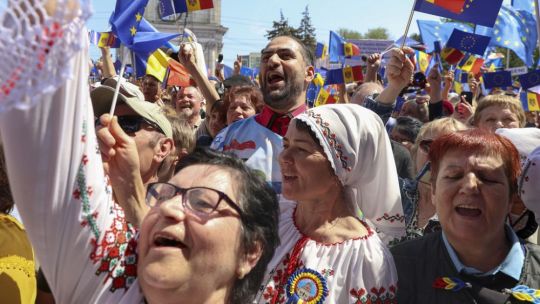
View On WordPress
3 notes
·
View notes
Text
EU expansion requires an internal restructuring of the Union
EU expansion requires a restructuring of the internal mechanisms of the Union.
War in Ukraine has changed the geopolitical structure of almost the entire globe, from China to India via Turkey. Perhaps some of these changes will be fleeting. However, one change is sure to be long-lasting: the formation of a new European order, which has been hotly debated recently. The war in Ukraine has left Brussels scrambling to admit new members for the first time in more than a decade and prepare the bloc for what is likely to be its last major enlargement.
On the sixth of October, the leaders of the 27 EU member states will meet at a summit in Spain to discuss the stages of the bloc’s enlargement and consider how the new union will work. The path to EU membership for the new entrants – Albania, Serbia, Ukraine, Moldova and Georgia – will not be easy.
Read more HERE

#world news#world politics#news#europe#european news#european union#eu politics#eu news#europa#membership#ukraine#ukraine news#albania#serbia#moldova#georgia
0 notes
Text
European Commission recommends EU 'candidate status' for Ukraine
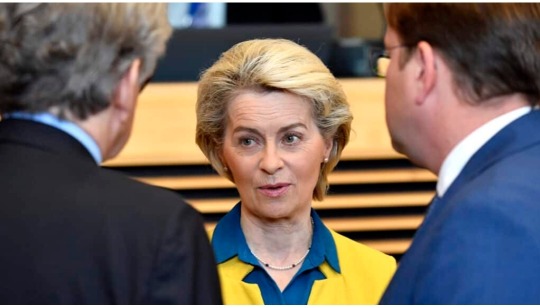
The European Commission has recommended that Ukraine be granted European Union candidate status, its president, Ursula von der Leyen, said during a press conference on Friday, a day after the bloc's most powerful leaders visited Kyiv.
The European Commission proposes to give Ukraine the status of a candidate for European Union membership, EU Commission chief Ursula von der Leyen said on Friday, adding that this was on understanding that Ukraine carry out number of reforms.
“Ukraine has clearly demonstrated the country’s aspiration and the country’s determination to live up to European values and standards,” she told reporters in Brussels.
For her statement, von der Leyen wore Ukraine’s colours, a yellow blazer over a blue shirt.
Leaders of EU countries are expected to endorse the decision at a summit next week. The leaders of the three biggest - Germany, France and Italy - had signalled their solidarity on Thursday by visiting Kyiv, along with the president of Romania.
Von der Leyen announced that the European Commission also recommended granting candidate status for Moldova, Ukraine’s ex-Soviet neighbour, but held off on taking the same step on Georgia.
#volodymyr zelensky#volodymyr zelenskyy#wolodymyr selenskyj#president zelensky#president zelenskyy#selenskyj#volodomir zelensky#president volodymyr zelenskyy#vladimir zelensky#volodimir zelenski#zelensky#sele#ukranian#russian invasion of ukraine#ukrainian president#ukraine president#ukraine#ukrayna#eu#europe
23 notes
·
View notes
Text
Daily Wrap Up June 17, 2022
Under the cut: Boris Johnson has offered battlefield training for tens of thousands of Ukrainian troops, during an unannounced visit to Ukraine for talks; Ukraine introduces visa regime for Russian citizens; The European Union's executive arm on Friday recommended making Ukraine a candidate for EU membership; Negotiations are underway to allow for the safe evacuation of hundreds of civilians sheltering at a chemical plant in Severodonetsk, the head of the district’s military administration told Ukrainian television (only to Russian occupied territory, though); Units of the Defense Forces of Ukraine forced the enemy to leave the village of Dmytrivka, Izium district, Kharkiv region.
“Boris Johnson has offered battlefield training for tens of thousands of Ukrainian troops, during an unannounced visit to Ukraine for talks with president Volodymyr Zelensky.
The prime minister’s second trip to the war-torn country comes a day after a joint visit by French president Emmanuel Macron, German chancellor Olaf Scholz and Italian PM Mario Draghi.
He said that a UK-led programme using British Army expertise could train as many as 10,000 Ukrainian service personnel every 120 days outside the country, in a move which he said could “change the equation” in the war against Russian invaders.
“My visit today, in the depths of this war, is to send a clear and simple message to the Ukrainian people: the UK is with you, and we will be with you until you ultimately prevail,” said Mr Johnson
“As Ukrainian soldiers fire UK missiles in defence of your nation’s sovereignty, they do so also in defence of the very freedoms we take for granted.
“That is why I have offered President Zelensky a major new military training programme that could change the equation of this war –harnessing that most powerful of forces, the Ukrainian determination to win.
“Two months on from my last visit, the Ukrainian grit, determination and resilience is stronger than ever, and I know that unbreakable resolve will long outlive the vain ambitions of President Putin.””-via Yahoo News
~
”Ukraine introduces visa regime for Russian citizens.
In the framework of counteracting unprecedented threats to the national security, sovereignty and territorial integrity of our state, he suggested that the Cabinet of Ministers consider revising the regime of entry of Russian citizens into Ukraine.
And today the Cabinet of Ministers must make this important decision - the Resolution "On termination of the Agreement between the Government of Ukraine and the Government of the Russian Federation on visa-free travel for citizens of Ukraine and the Russian Federation and application of some international agreements of Ukraine with the Russian Federation."
According to the planned decision of the Cabinet of Ministers, from July 1, 2022, Ukraine will introduce a visa entry regime for Russian citizens.” -via President Zelenskyy’s Telegram (Ukrainian, translated)
~
“The European Union's executive arm on Friday recommended making Ukraine a candidate for EU membership, a first step on what was expected to be a long road for the war-torn country to join the 27-nation bloc.
The European Commission delivered its proposal to award Ukraine candidate status after a fast-tracked analysis of answers to a questionnaire. The Ukrainian government applied for EU membership less than a week after Russia invaded the country.
"Ukrainians are ready to die for the European perspective," commission President Ursula von der Leyen said. "We want them to live with us, the European dream."
The leaders of the bloc's existing members are scheduled to discuss the recommendation during a summit next week in Brussels. The European Commission's endorsement, while a strong sign of solidarity with Ukraine, is likely to take years or even decades to materialize into EU membership.
Along with Ukraine, the European Commission also recommended giving neighboring Moldova EU candidate status. The commission also reviewed Georgia's application but said the Caucasus nation first needs to fulfill a number of conditions.”-via NPR
~
“Negotiations are underway to allow for the safe evacuation of hundreds of civilians sheltering at a chemical plant in Severodonetsk, the head of the district’s military administration told Ukrainian television.
“A ceasefire and a corridor are being negotiated, but there are a lot of Russian provocations and ‘games,’” Roman Vlasenko said, though made clear that he did was not personally involved in talks.
Russia earlier this week said that it would open a “humanitarian corridor” for civilians at the plant to evacuate, but only to Russian-controlled territory to the north, not to Ukraianian-held Lysychansk to the west.
Serhiy Hayday, head of the regional military administration, told CNN on Thursday that an evacuation would be possible only if there were a complete ceasefire, but that he was highly skeptical of any promises made by Russia.
Vlasenko said that the situation at the Azot plant was “tense.”
“Bridges are all blown up, there is no direct access to Lysychansk,” he said. “We use creative approaches to communication and logistics.”"
At repeated points during the war, Ukrainian officials say, Russian forces have broken promises to open evacuation corridors, driven civilian evacuees onto their territory and failed to observe ceasefire agreements.”-via CNN
~
“Units of the Defense Forces of Ukraine forced the enemy to leave the village of Dmytrivka, Izium district, Kharkiv region.
In the Slavic direction , the enemy's main efforts are focused on continuing the offensive in the direction of the city of Slavyansk, the fighting continues. He tried to conduct reconnaissance near Krasnopil by battle, was unsuccessful, and retreated.
The enemy carried out systematic artillery shelling in the areas of the settlements of Dibrivne, Pashkove, Hrushuvakha, Kurulka, and Velyka Komyshuvakha.” -via Pravda (Ukrainian source)
~
17 notes
·
View notes
Text
From "Associated Trio" to "Geographically Distant Trio"
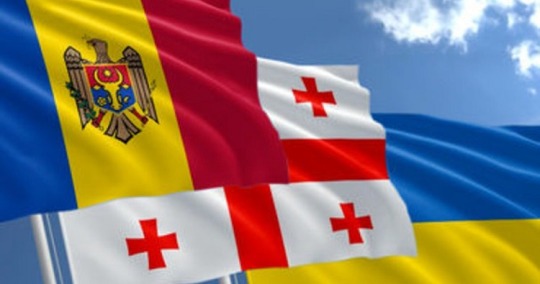
Georgia is no longer accepted into the European Union, allegedly because, together with Armenia and Azerbaijan, it is geographically far from the European Union. It is strange that strategic partners did not notice this before ...
On June 22, the Secretary General of the ruling Georgian Dream, Tbilisi Mayor Kakha Kaladze, sharply criticized French President Emmanuel Macron because of his words about Georgia's remoteness from Europe. “It is very disappointing to hear that Georgia is geopolitically uninteresting. For so many years we have been striving for Europe, but have they now seen our location? It's just amazing! I don’t even know how to comment on this,” he said at a meeting of the Tbilisi government. His words came as a reaction to Macron's words that, unlike Ukraine and Moldova, Georgia, Azerbaijan and Armenia "are located geopolitically and geographically in a different place."
The mayor vowed to continue efforts to get Georgia the status of a candidate country for EU membership, as is the case with Ukraine and Moldova. “We will do everything so that our country becomes a member of the European family as soon as possible,” said Kakha Kaladze.
He also noted that the EU is making a "political decision", not taking into account that Georgia is the leader in the field of reforms in the Associated Trio itself, which also includes Ukraine and Moldova. According to him, "Georgia is actually being punished by not being granted the status of a candidate country now." “This is very bad and regrettable,” said Kakha Kaladze.
The issue of granting Georgia the status of an EU candidate country will return at the end of the year. In the meantime, Brussels has put forward 12 conditions for Tbilisi to consider the application.
3 notes
·
View notes
Text
Russia-Ukraine Daily Briefing
🇷🇺 🇺🇦 Monday Briefing:
- Russia, Ukraine give conflicting Zaporizhzhia frontline accounts
- EU weighs advancing Ukraine's membership bid
---------------------------------------------------
- Ukraine hits Russian shipyard in Crimea port, damages ship
- Near Donetsk front line, Ukraine artillery crew face intensifying fire
- US lawmakers still debate Israel and Ukraine aid
- Ukraine's military coming up with plans to 'move forward faster'
- Zelensky says 'not ready' to talk to Russia
- Russian nuclear submarine test launches Bulava intercontinental missile
- Russia’s plans to establish mil bases in Libya spark concern in US over potential ‘to spy on all of EU’
- Romania to commit €50M in EU scheme subsidizing Ukraine’s debt
- Ukraine files charges against Russian Orthodox chief
- Pro-European backers confident in Moldova poll amid Russian meddling allegations
-------------------------------------------
📨 More in a daily newsletter: https://russia-ukraine-newsletter.beehiiv.com/subscribe
💬 My socials: https://linktr.ee/rvps2001

#russia ukraine war#ukraine russia war#ukraine war#russian army#russian war crimes#news#newsletter#russia#ukraine
4 notes
·
View notes